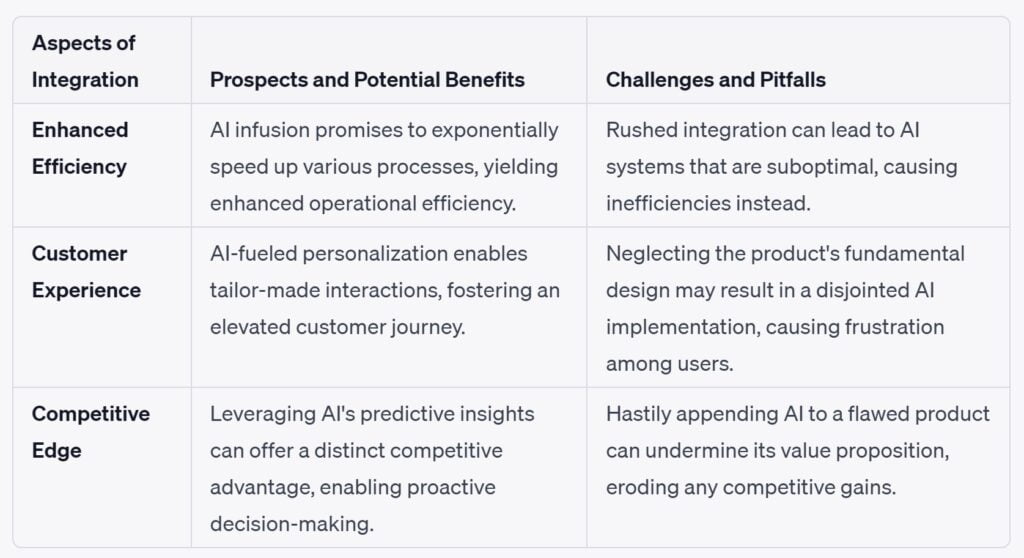Table of Contents
The Fake Rebranding
As the technologic phenomenon of artificial intelligence (AI) has surged into the spotlight, a multitude of companies have pivoted their attention towards harnessing the potential of this cutting-edge tool to augment their products and services. Yet, amidst this pursuit of innovation, an alarming and counterproductive trend has emerged – the metamorphosis of lackluster or substandard offerings into purported AI-powered marvels. This maneuver may present itself as an expedient solution, akin to a swift magical trick, but beneath its superficial allure lies a labyrinth of disappointments and potential damage to a company’s hard-earned reputation. This exposé endeavors to navigate through the treacherous terrain of rebranding subpar products through the veil of AI, unearthing the lurking pitfalls that render it a transient and unsustainable strategy in the grand scheme of long-term triumph.
Artificial Intelligence (AI) has emerged as an enchanting beacon, captivating the minds of visionary leaders and discerning consumers in equal measure. This technological marvel possesses an innate potential to redefine entire industries, elegantly streamline convoluted processes, and elevate the overall spectrum of customer experiences to unprecedented heights. Consequently, the corporate arena finds itself abuzz with a palpable eagerness to infuse AI’s transformative prowess into the very essence of their offerings. However, this fervor to adopt AI solutions, like a comet streaking across the night sky, can occasionally cast an overshadowing glow that obscures a vital facet – the meticulous scrutiny of a product’s foundational underpinnings.
As businesses earnestly embark on their journeys to integrate AI, they often traverse a path that zigzags between the realms of anticipation and impatience. It’s akin to a chef seeking to master a complex recipe while neglecting to focus on the quality of the ingredients. Just as a delightful dish hinges upon the essence of its constituents, the triumphant deployment of AI rests upon the robustness of the product it bolsters
The allure of Artificial Intelligence’s transformative allure can sometimes blind businesses to the significance of a measured, thoughtful integration strategy. Just as a foundation is vital for a towering skyscraper’s stability, a robust core product is essential for AI’s meaningful and enduring impact. Companies must not sprint through AI implementation to merely join the ranks of the technologically advanced, as doing so risks their standing in the long run. Instead, they should take a page from the tortoise’s playbook, recognizing that a steady, calculated pace often outpaces the hasty sprint.
6 Things to Watch for When AI Rebranding:
The Rebranding Illusion
While the intrigue of AI is undoubtedly alluring, it’s imperative to recognize that its magic is most potent when woven into a product’s very DNA. The data-backed table underscores the dual nature of AI integration – laden with potential yet fraught with peril. Let us navigate this exciting frontier with patience, ensuring that the marvel of AI doesn’t obscure the necessity of a strong foundational product, much like a gem set in a carefully crafted ring.
Rebranding a bad product as AI-powered creates a mirage of improvement. It capitalizes on the perceived futuristic and sophisticated nature of AI, making consumers believe that the product’s flaws have been fixed. This illusion can be enticing both for companies looking for a quick turnaround and consumers seeking better solutions. However, this strategy tends to overlook fundamental issues that have led to the product’s underperformance in the first place.
Ignoring Core Problems
When a company chooses to rebrand a bad product with AI, it often fails to address the core problems that caused the product to be ineffective or undesirable. Whether it’s poor design, lack of functionality, or inadequate market research, these issues can’t be magically solved by incorporating AI. In fact, integrating AI into a flawed product might exacerbate existing problems and introduce new complexities, resulting in an even more frustrating user experience.
Short-Term Gain, Long-Term Pain
Rebranding a bad product with AI can lead to short-term gains, but the long-term consequences can be damaging. The initial excitement generated by the AI rebranding might boost sales temporarily, but customers will eventually realize that the underlying issues persist. This can lead to customer dissatisfaction, negative reviews, and a tarnished brand reputation. Building customer trust takes time, and misleading them with a rebranded product can erode that trust irreparably.
Misalignment of Expectations
One of the most significant pitfalls of this strategy is the misalignment of expectations. When customers perceive a product as AI-powered, they naturally expect a certain level of performance and sophistication. If the rebranded product falls short of these expectations, the disappointment can be far more pronounced than if it were marketed under its original name. This can lead to high return rates, increased customer support inquiries, and a loss of loyal customers.
Investment in Superficial Changes
Rebranding a product with AI often focuses on superficial changes rather than addressing the core issues. Companies might invest heavily in creating an AI-driven user interface or integrating voice recognition, for example, while neglecting to improve the product’s fundamental functionality. This approach not only wastes resources but also diverts attention away from the necessary work of improving the product’s essential features.
The Ethical Dimension
Rebranding a bad product as AI-powered isn’t just a strategic misstep; it can also raise ethical concerns. Misleading customers by implying that a product’s deficiencies have been resolved through AI can be viewed as deceptive marketing. As AI continues to play an increasingly significant role in our lives, transparency and honesty in its implementation are crucial for building trust with consumers.
Personalized Advertising in e-Commerce
Datafication has had a significant impact on the digital footprint of e-commerce platforms, especially in the realm of personalized advertising. Let’s consider a use case where datafication has played a pivotal role in improving the digital footprint of an online retail website.
Bottom Line:
It’s tempting for companies to rebrand their bad products as AI-powered solutions. However, this strategy is a short-sighted approach that fails to address the core issues plaguing the product. The allure of AI should not overshadow the importance of providing genuinely valuable products and services to customers. Instead of relying on superficial changes, businesses should invest in understanding customer needs, conducting thorough market research, and making substantial improvements. AI can be a powerful tool when used thoughtfully, but it’s not a magic wand for fixing fundamentally flawed products. True success lies in a commitment to quality, honesty, and continuous improvement.


